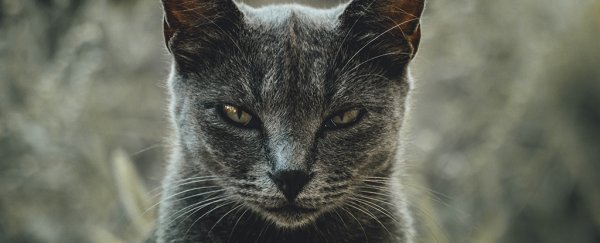What, exactly, is your cat thinking? Scientists have come up with a questionnaire that might give you some idea of where your feline friend fits on what's known as the triarchic model of psychopathy.
The model measures levels of boldness, meanness, and disinhibition in order to assess overall psychopathic tendencies. Ordinarily, the test is for human beings, of course, but here it's being applied to cats.
Having completed the survey – which you can find online – you'll be given what's called a CAT-Tri+ measure for your pet's level of psychopathy. The team is hoping that knowing this score can improve human and cat relationships.
"Our cats and the differences in their personalities inspired us to start this research," psychologist Rebecca Evans, from the University of Liverpool in the UK, told Motherboard.
"Personally, I am also interested in how owner perceptions of psychopathy in their cat can affect the cat-owner relationship. My cat Gumball scores relatively highly on the disinhibition scale – which means he can be quite vocal, proximity-seeking and excitable."
The questionnaire asks for information about how adventurous your cat is when exploring, how it reacts to danger, how it responds to other cats, whether or not it needs constant stimulation, and how well it follows house rules.
Related behaviors – including sudden mood changes, aggression towards new people, and reactions to being petted – are also explored. In each instance you can mark your feline on a scale of "does not describe my cat" to "describes my cat extremely well".
Other factors, measuring human-unfriendliness and pet-unfriendliness, are also included in the test, to help understand the relationship between the cat and owner.
From a total of 46 responses overall, you can work out your cat's CAT-Tri+ score for psychopathy. In humans, psychopathy is often characterized by a lack of empathy and a tendency to manipulate others – though psychopaths can appear normal and charming on the surface.
"It is likely that all cats have an element of psychopathy as it would have once been helpful for their ancestors in terms of acquiring resources: for example food, territory, and mating opportunities," Evans said in a statement.
The ultimate aim of the study is to give us a better understanding of our cats. Those that score more highly for boldness might benefit from spending more time with scratching posts or climbing obstacles, for example.
Unwanted cats are still often abandoned or left to shelters (where they may be euthanized), and the research team is hoping that a psychological study like this can help identify unwanted behaviors in cats, so owners can perhaps make adjustments to their environments or training accordingly.
Relationships between 2,042 cat owners and their pets were studied in order to come up with the final questionnaire, with the researchers also able to tease out some patterns from the volunteers who have already answered the questions.
"Disinhibition and pet-unfriendliness predicted a higher quality cat-owner relationship; meanness and boldness predicted a lower quality relationship," the researchers write in their paper.
The research has been published in the Journal of Research in Personality.
